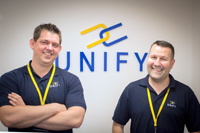 The role of technology as a driver for business transformation is well understood. Not so well known is how ICT can help put lives that have gone off the rails back on track, according to Eddie Bird and Adam Esposito, joint Managing Directors of Unify Business Solutions, who illustrate how rehabilitation within prisons can be greatly enhanced by communications technology.
The role of technology as a driver for business transformation is well understood. Not so well known is how ICT can help put lives that have gone off the rails back on track, according to Eddie Bird and Adam Esposito, joint Managing Directors of Unify Business Solutions, who illustrate how rehabilitation within prisons can be greatly enhanced by communications technology.
An early contract win soon after Chesterfield-based Unify Business Solutions was established in 2003 set the company on the path to becoming a global player in the prison sector. It all changed when the joint MDs signed up HMP Doncaster, which is still a customer. "That initial link with the custodial sector led us to work with a number of prisons in the UK, Channel Islands and New Zealand," commented Bird. "We have developed our own in-cell technology that aids the shift in focus to rehabilitation within the prison environment. Being able to contact friends and family in a safe and secure way can help support the reduction of reoffending."
Unify Business Solutions' technology also provides high level speech analysis which can quickly and easily identify calls of interest and provide intelligence to prison service staff. The company recently deployed such in-cell technology for the newly built Auckland South Correctional Facility. "As we'd successfully provided technology for prisons in the UK and the Channel Islands it didn't seem like too much of a challenge to do it on the other side of the world," added Esposito. "We carry out some of the work remotely and have good contacts which ensures everything runs smoothly. We also have the support of a local company called Baycom."
Unify claims two prison sector firsts: Providing the first in-cell phones in the UK and again in the southern hemisphere. "We could have focused on just doing telecoms and IT for business, but we had the foresight to employ our own software development team and develop our own products," added Bird. "We're looking at other areas globally where we can work with the prison sector and have increased the number of people in our development team to support the needs of each prison."
Unify has developed its own bespoke phone system which reduces violence and cuts reoffending within the prison system. Bespoke PIN systems offer the facility to dial predefined numbers, along with call monitoring and recording, system lockdown and the ability to place time restrictions on calls. It is targeted at prisons, detainment centres, immigration centres, nursing homes, hospitals and anywhere where a secure telephone system is required.
"The ability for residents or prisoners to be able to call predetermined numbers for family, friends or support groups creates the incentive to not reoffend and reduces the lack of privacy," stated Bird. "When placed in the cell it removes queues for wing phones and therefore the flashpoints that can cause bullying and violence."
Unify's Call Control System (UCCS) is a secure platform that polices all calls made to the outside world. Calls can be monitored and controlled, and recorded calls can be played back on demand. The UCCS includes an integrated reporting system as well as adjustable call rates so that prisoners can be billed different tariffs. Furthermore, Unify offers its own mobile detection system which solves the problem of unauthorised mobile phones in secure environments. "The Unify Mobile Detection System (UMDS) is completely covert and because it detects rather than blocks it means that it does not present any legal considerations," added Esposito.
Unify Business Solutions is pressing ahead with opportunities in Asia Pacific and plans are under way to start work in Western Australia. Business partner Serco currently runs two prisons in the region including Acacia Prison, a medium security facility accommodating approximately 1,500 male prisoners. Unify is working with Serco to provide business plans to Acacia Prison which will highlight the benefits of in-cell telephony and 'make a difference on the inside'.
Bird's first links to 'down under' were forged at the age of 21 when he went to Australia and by chance got a job selling mobile phones. Returning to the UK he secured a position with a Cellnet mobile dealer and Siemens partner, where he first met future business partner Esposito who was working for a datacoms company that supplied the mobile dealer. "We went for a Little Chef together and our friendship was cemented over an Olympic Breakfast," stated Bird.
"The idea of forming our own company came about after we both faced redundancy. Initially, the business started out with just the two of us but now we have a team of engineers, a software development team as well as sales, marketing and finance. Our expansion is reflected in the company turnover which was £270k in the first year and is now over £4 million. We're looking at getting to £10 million over the next three years."
Deals of importance won by Unify also include supplying comms and IT systems for London Cycle Hire, Rosebys and Ronseal. They are all likely to be long-term clients. "The businesses we work with, no matter how big or small, tend to stick with us for the long-term which is a testament to our support team," said Esposito. "We'll continue to grow the business and prison services sides of the company. We employ a hard working team who have a wide range of product knowledge and provide excellent customer service. It's not all serious. There's plenty of banter and lively discussions to keep everyone entertained."•
